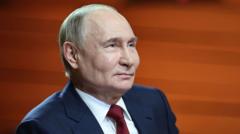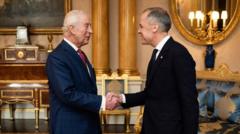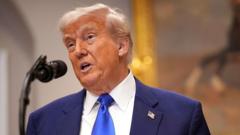Officials in Vietnam are bending laws to support a $1.5 billion golf complex tied to the Trump family, revealing the implications of intermingled political and business interests.
Vietnam's Compromise: Fast-Tracking Trump Family Golf Project Amid Diplomatic Pressure

Vietnam's Compromise: Fast-Tracking Trump Family Golf Project Amid Diplomatic Pressure
Vietnam's government prioritizes Trump projects as trade negotiations heat up, raising ethical concerns.
In a striking move, Vietnamese officials recently undertook door-to-door campaigns urging local residents to endorse the Trump Organization's proposed golf community, against a backdrop of resistance from individuals like Le Van Truong. Despite his concerns about losing ancestral land and a local cemetery, Truong, 54, ultimately felt compelled to comply, stating, “there’s nothing I can do.”
The $1.5 billion Trump golf project, located near Hanoi, marks the family's inaugural ventures in Vietnam—part of a broader strategy that blends business ambitions with political influence, unprecedented for a sitting U.S. president's family. As the Trump Organization seeks to enrich itself globally, the repercussions on international relations are becoming increasingly apparent.
To expedite the project, Vietnam has disregarded its regulatory frameworks, according to legal experts, providing concessions that far exceed typical approvals for local businesses. A newly surfaced letter from Vietnamese officials highlights that the project was granted special governmental support, attributed to its heightened significance under President Trump’s direct oversight. The officials recognized that the project's backing aligned with urgent diplomatic efforts to negotiate favorable trade agreements, mitigating President Trump's threats of imposing steep tariffs on Vietnamese exports.
As Vietnam navigates this complex intersection of business and governance, the implications of such preferential treatment for Trump-related enterprises are likely to reverberate through its political landscape and economic strategy. Central to this controversy is a troubling blend of national interest, local dissent, and the extensive reach of familial business ventures into the global political arena.
The $1.5 billion Trump golf project, located near Hanoi, marks the family's inaugural ventures in Vietnam—part of a broader strategy that blends business ambitions with political influence, unprecedented for a sitting U.S. president's family. As the Trump Organization seeks to enrich itself globally, the repercussions on international relations are becoming increasingly apparent.
To expedite the project, Vietnam has disregarded its regulatory frameworks, according to legal experts, providing concessions that far exceed typical approvals for local businesses. A newly surfaced letter from Vietnamese officials highlights that the project was granted special governmental support, attributed to its heightened significance under President Trump’s direct oversight. The officials recognized that the project's backing aligned with urgent diplomatic efforts to negotiate favorable trade agreements, mitigating President Trump's threats of imposing steep tariffs on Vietnamese exports.
As Vietnam navigates this complex intersection of business and governance, the implications of such preferential treatment for Trump-related enterprises are likely to reverberate through its political landscape and economic strategy. Central to this controversy is a troubling blend of national interest, local dissent, and the extensive reach of familial business ventures into the global political arena.



















